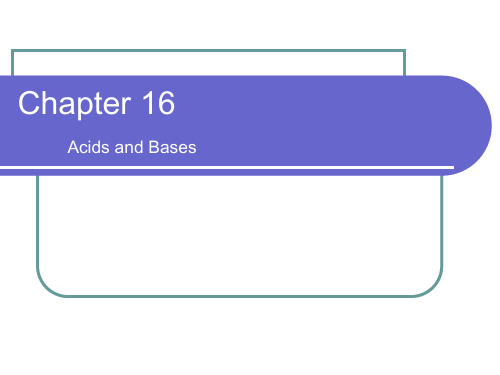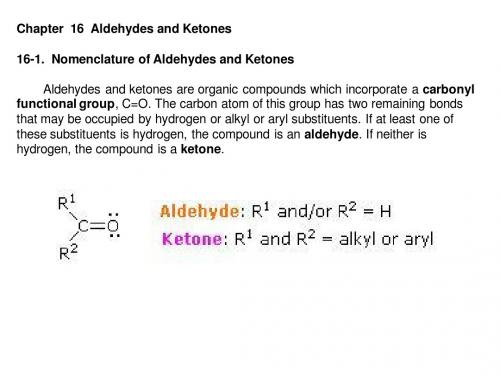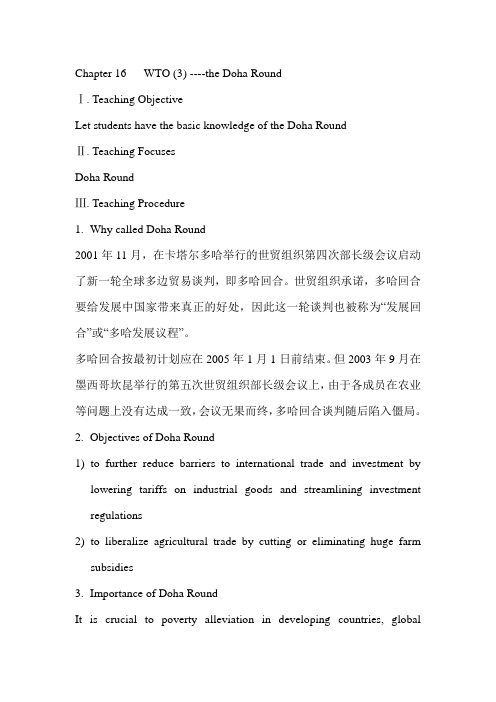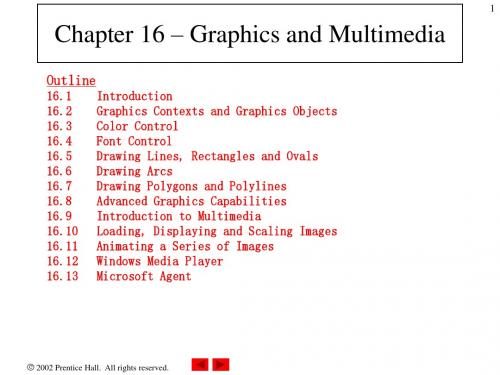Chapter_16
- 格式:pdf
- 大小:78.19 KB
- 文档页数:44




Chapter 16 WTO (3) ----the Doha RoundⅠ. Teaching ObjectiveLet students have the basic knowledge of the Doha RoundⅡ. Teaching FocusesDoha RoundⅢ. Teaching Procedure1.Why called Doha Round2001年11月,在卡塔尔多哈举行的世贸组织第四次部长级会议启动了新一轮全球多边贸易谈判,即多哈回合。
世贸组织承诺,多哈回合要给发展中国家带来真正的好处,因此这一轮谈判也被称为“发展回合”或“多哈发展议程”。
多哈回合按最初计划应在2005年1月1日前结束。
但2003年9月在墨西哥坎昆举行的第五次世贸组织部长级会议上,由于各成员在农业等问题上没有达成一致,会议无果而终,多哈回合谈判随后陷入僵局。
2.Objectives of Doha Round1)to further reduce barriers to international trade and investment bylowering tariffs on industrial goods and streamlining investment regulations2)to liberalize agricultural trade by cutting or eliminating huge farmsubsidies3.Importance of Doha RoundIt is crucial to poverty alleviation in developing countries, globaleconomic growth and international cooperation4.Background against which Doha Round occurred1)GDP growth slowed down2)9.11 terrorism3)Global trade declined5.Issues on Doha Agenda1)Agriculture2)Service, including education, healthcare, tourism, banking, insurance,etc.3)Reduction of industrial tariffs4)Environment5)Reform of WTO rules6)Government procurement and investment7)Intellectual property rights and public health多哈回合谈判范围包括8 个具体议题,即农业、非农产品市场准入、服务贸易、规则谈判、贸易与发展、争端解决、知识产权、贸易与环境问题。


论语全文及译文《论语》是中国古代文化中的重要经典之一,它记录了孔子及其弟子的言行和思想,堪称中国古代伦理道德的百科全书,对后世思想产生了深远的影响。
本文将为大家介绍《论语》的全文及译文。
一、《论语》的全文《论语》是一部由孔子及其弟子的言行和思想所组成的文集,包含了22篇,约有500余段。
它不是按时间顺序编排的,而是按主题和内容分类整理的,其中包括“学而篇”、“为政篇”、“仁篇”、“义篇”、“礼篇”等。
具体来说,《学而篇》主要探讨的是教育问题,包括学习态度、为人处世等方面的问题。
重要的章节有“有朋自远方来,不亦乐乎?”、“君子不器”、“己所不欲,勿施于人”等。
《为政篇》则主要关注的是政治问题,探讨如何做一位好的领袖,如何治理国家。
重要的章节有“君子务本,本立而道生”、“人而无信,不知其可也”、“舜发于畎亩之中,傅说举于版筑之间”等。
《仁篇》则论述的是仁爱之道,探讨如何做一位道德高尚的人。
重要的章节有“君子喻于义,小人喻于利”、“己所不欲,勿施于人”、“人能弘道,非道弘人”等。
《义篇》则探讨的是如何能做到正直,着眼于人与人之间的道德关系。
重要的章节包括“三人行,必有我师焉”、“君子坦荡荡,小人长戚戚”、“恭而无礼则劳,慎而无礼则葸”等。
《礼篇》则关注的是社会文化方面的问题,探讨如何做到礼貌得体。
重要的章节有“弟子入则孝,出则弟”、“朝闻道,夕死可以矣”、“三年无改于父之道,可谓孝矣”等。
二、《论语》的译文随着全球化的发展,越来越多的人开始学习中文和中国文化。
为了让更多的人能够深入理解《论语》的思想精髓,本文提供一份《论语》的英文译文供大家参考。
《学而篇》中的几个重要章节的英文译文如下:“Is it not a pleasure to have friends coming from distant quarters?” (Chapter 1)“The wise find pleasure in water; the virtuous find pleasure in hills. The wise are active; the virtuous are tranquil. The wise are joyful; the virtuous are long-lived.” (Chapter 6)“The Master said, "In archery it is not going through the leather which is the principal thing; - because people's strength is not equal. This was the old way." (Chapter 9)“The Master said, "The cautious seldom err." (Chapter 16)《为政篇》中的几个重要章节的英文译文如下:“The Master said, "It is only the man who is possessed of the most complete sincerity that can exist under heaven, who can give its full development to his nature. Able to give its full development to his own nature, he can do the same to the nature of other men." (Chapter 1)“The Master said, "A. youth, when at home, should be filial, and, abroad, respectful to his elders. He should be earnest and truthful. He should overflow in love to all, and cultivate the friendship of the good. When he has time and opportunity, after the performance of these things, he should employ them in polite studies." (Chapter 2)“The Master said, "The man who is fond of daring and is dissatisfied with poverty, will proceed to insubordination. So will the man who is not virtuous, when you carry your dislike of him to an extreme." (Chapter 8)《仁篇》中的几个重要章节的英文译文如下:“Tzu-kung asked about the practice of virtue. The Master said, "The mechanic, who wishes to do his work well, must first sharpen his tools. So must the teacher do likewise." (Chapter 1)“Tsze-lu said, "The ruler of Wei has been waiting for you, in order with you to administer the government. What will you consider the first thing to be done?" The Master replied, "What is necessary is to rectify names." (Chapter 13)“The Mas ter said, "When a man stands in the proper relation to his fellow-men, he has fulfilled the relation to them; when he stands in the proper relation to his ruler, he has fulfilled the relation to his ruler. (Chapter 20)《义篇》中的几个重要章节的英文译文如下:“The Master said, "With coarse rice to eat, with water to drink, and my bended arm for a pillow; - I have still joy in the midst of these things. Riches and honors acquired by unrighteousness, are to me as a floating cloud." (Chapter 7)“The Master said, "The cautious seldom err." (Chapter 16)“The Master said, "A horse is called a faithful beast, and there are others who are faithful without being called so. Li Yi* behaved with conspicuous fidelity to the purposes of his friend." (Chapter 22)《礼篇》中的几个重要章节的英文译文如下:“The Master said, "The object of the superior man is truth. Food is not his object. There is plowing; - even in that there is sometimes want. So with learning; - emolument may be found in it. The superior man is anxious lest he should not get truth; he is not anxious lest poverty should come upon him." (Chapter 1)“Tsze-chang asked, saying, "What is the way of a man?""The Master said, "The way of a superior man is threefold, virtuous; he is free from anxieties; wise; he is free from perplexities; bold; he is free from fear.""(Chapter 16)“The Master said, "Being in a state of superior distress, it is still necessary to have friends." (Chapter 22)三、总结《论语》是中国古代文化中的重要经典,它记录了孔子及其弟子的言行和思想,包含了22篇,约有500余段。
月底临近,按照公司的惯例,开始找销售业绩差的销售代表谈话,找个冠冕的理由让她们从酒店滚蛋。
瞧肖楠的模样,苏琪这次该是被淘汰的那个。
楚爱知道这会儿苏琪肯定又把自己骂个遍。
楚爱真是觉得屈得慌。
两人一走,莫纳也回到自己的座位上,收拾桌面的东西,说:“我和你打赌,再回来的时候,苏琪肯定趾高气扬,把谁都不放在眼里。
”楚爱:“那可不一定,这个月的成绩明摆着放那呢,我不信穆怀生能把肖楠怎么样。
莫纳神色轻蔑:“不到最后一刻,谁都不知道结果如何。
我没告诉你吧,林思渺已经开始收拾东西了,这个月酒店里要走不少人呢!”“你说什么?林思渺收拾东西?他要辞职吗?”楚爱急了:“你说话啊,别放屁放一半,让人等着熏!”莫纳不耐烦地看楚爱:“随便说说的,你那么紧张干什么。
我说,你到底有没有想好,我上次和你说的话,你考虑的怎么样了?合计着,我怎么觉得你关心林思渺关心得有些过头?”“我对谁都这样!”楚爱端正身子,平淡地问:“那部门是真的要合并了?”“不信我的,你自己没长嘴不会去问他?”楚爱不等莫纳说完,已经大步跑了出去。
莫纳看着楚爱的背影,双手抱胸,眼眸中神色复杂,一言难清。
问就问,我还抖索你不成!楚爱直接去总监办公室,刚要敲门进去,突然想到肖楠和苏琪在里面。
这时候,林思渺肯定不会在场的。
只得折回去。
楚爱没走几步看见苏米离开的身影,于是加快步子追了上去。
“苏米!”楚爱扬起笑容:“刚从总监那出来?”苏米见是楚爱,热情地说:“不是,刚要去,见里面正忙,就没打扰,等会儿还要在去找总监一次。
”楚爱看见她手上拿的业绩表,明知故问:“成绩汇总出来了?”苏米笑得更轻了,还有一股子“别以为我不知道你要干什么”的表情,随手把报表往楚爱怀里一塞:“我们什么关系,想知道自己的成绩就看呗。
”楚爱右眉跳跳,抛出个媚眼:“还是我们家苏米好!”“谁不知道楚爱你这个月的业绩红得不得了,连莫纳都没比得过你。
将来混发达了,可不要忘记我这个姐妹。
”苏米笑说着,凑过来,继续说:“他们和我说的时候,我还不信呢,结果一统计,你的成绩稳居榜首,看来这次穆总监是少不了要奖你的!”楚爱擦汗:“苏米,你别拿我开心了。